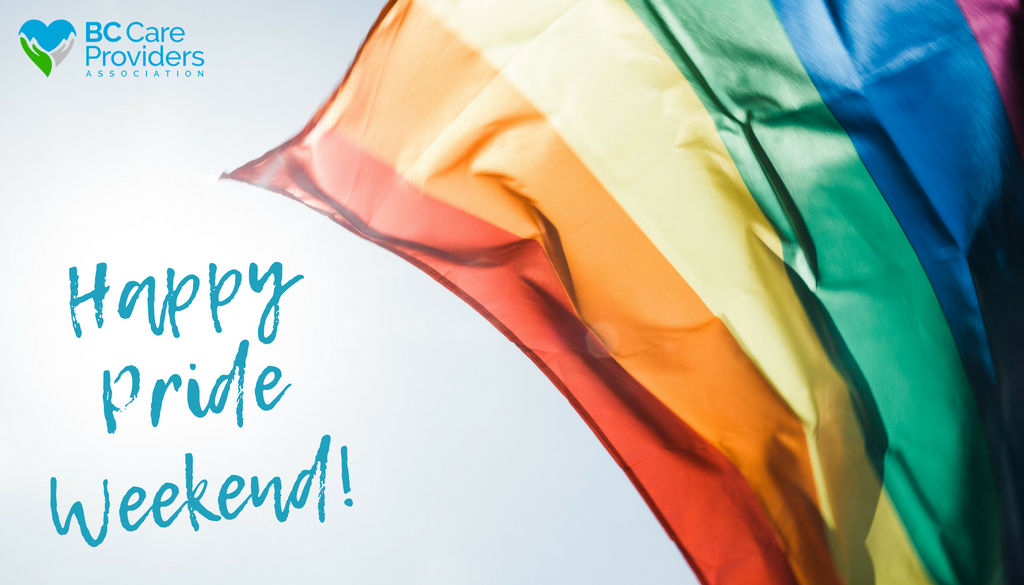This weekend throngs of Vancouverites will head down to the West End for the 40th Annual Pride Parade. In 40 years the parade has changed considerably, going from a protest, to a family-friendly celebration of progress, better rights and changed attitudes.
As we wish the community a happy Pride Weekend and celebrate the advocacy which has gone along with four decades of the parade, BC Care Providers Association is taking an opportunity to appreciate how the experiences of seniors who identify as LBGTTQ+ (lesbian, bi-sexual, gay, transgendered, two-spirited, queer) may affect their interactions with the continuum of care.
BCCPA spoke to Dean Malone, Executive Director of Haro Park, a West End campus of care and a leader in creating safe, inclusive spaces for LBGTTQ+ seniors and family members.
“It begins at the intake process,” says Malone. “When we’re asking questions to learn about a person like, ‘What matters most to you? Who are you? What can we do to help you live your best life?’”
“It’s also important to ask questions about sexuality, gender identity and gender expression. When we ask these questions, we might get some answers about how to support people in a loving, supportive environment.”
While it is critical to appreciate that aging people who identify as LBGTTQ+ will have experiences as diverse as the community itself, older LBGTTQ+ adults often worry about the stigma they might face when they, or a partner, transition into care, or receive home health care services. In some cases, they worry they will have to “go back into the closet.”
“I generally believe that we are past the point where LBGTTQ+ people aren’t getting the care they need. What happens is that they feel alone and isolated. You have someone coming into care, and suddenly they feel like they’re fifteen and the only gay kid in school. They worry they will be alone, that they will have no one to talk to,” says Malone.
“It is about creating spaces where people are comfortable to be themselves,” he adds.
Creating inclusive spaces is not just about the residents. It’s also about supporting families of LBGTTQ+ seniors.
“Things like gender-inclusive single-stall bathrooms might not mean much to our residents, but I believe it sends a strong message to the family members of our residents who are LBGTTQ+.”
There are many things that the health care sector, including the continuum of care, can do to be more inclusive:
- Challenge yourself at an individual level. For example, do you automatically assume that a person’s partner is of the opposite sex just because they are older?
- Use gender-neutral, non-heteronormative language whenever possible – using partner, instead of husband or wife, for example.
- Look carefully at forms and promotional materials. Are LBGTTQ+ people represented? Are checkboxes limiting? Is an “other” category offered for gender, for example? Push back when you notice that forms are outdated or non-inclusive.
- Encourage diversity on boards, family councils and other places where representation is important.
- For many LBGTTQ+ seniors, friends can be as important as family, especially as many may have become estranged from their own families earlier in life.
- Make yourself aware of the services available in your community for aging and out seniors. Such as those offered through QMUNITY.
- Take some time to read up on how older LBGTTQ+ people may experience health care differently, and what can be done to reduce stigma.
- If you do not already have them, consider gender-neutral bathrooms.
- Consider training for staff. Encourage a culture that does not make assumptions.
- Most importantly, ASK! Ask about sexuality, gender identity and gender expression.
When asked how Haro Park is celebrating pride, Malone explained they have had a week full of events.
“This Monday we had a drag show with two of Vancouver’s premier drag queens. Who does that? We created a space where everyone could feel comfortable. When the show was over, one of our residents who is non-verbal came up to me and gave me a big hug. It was a hug about her feeling free and accepted. It was a hug which said that she finally felt okay to be herself.”
Malone’s final advice was to avoid assumptions based on age.
“We cannot assume that just because someone is 90, they don’t get it. They probably talked about these things where they were last living. Even if they don’t identify as LBGTTQ+ themselves, they might have family members and friends who do.”
This pride, BCCPA is also taking a moment to appreciate the contributions which older members of the LBGTTQ+ community have made to securing critical human rights, ensuring inclusion and breaking down stigma. Now we must look at how we continue to support inclusion for this group across the continuing care sector.
Have a happy Pride Weekend!





